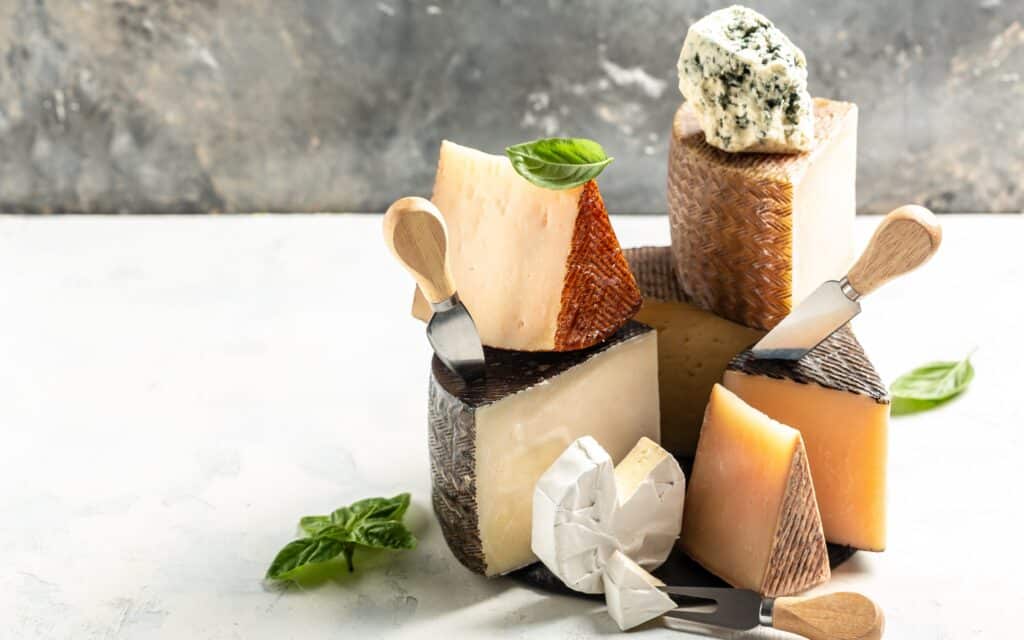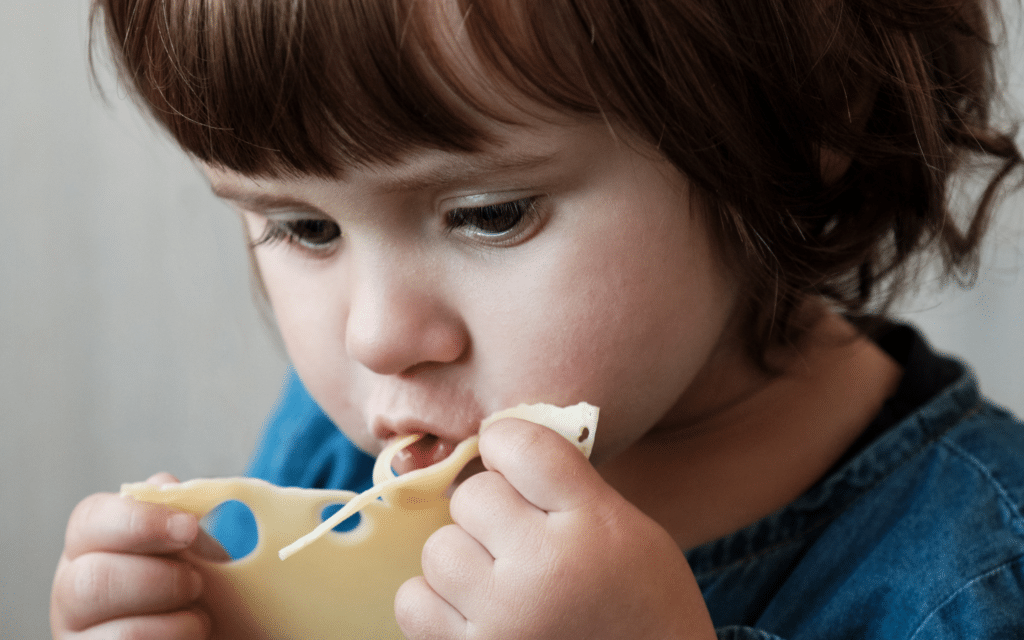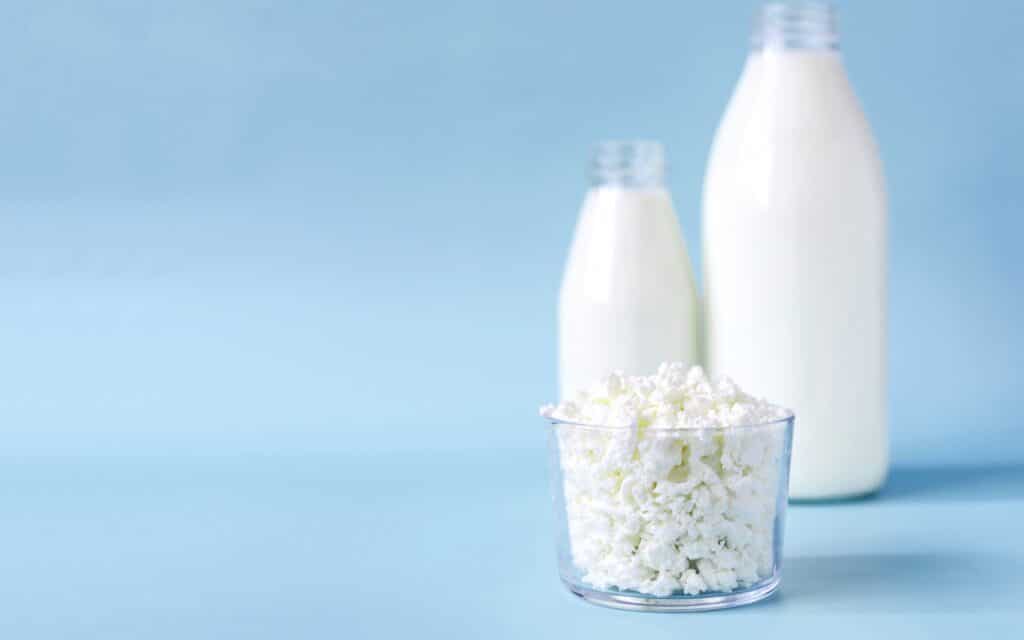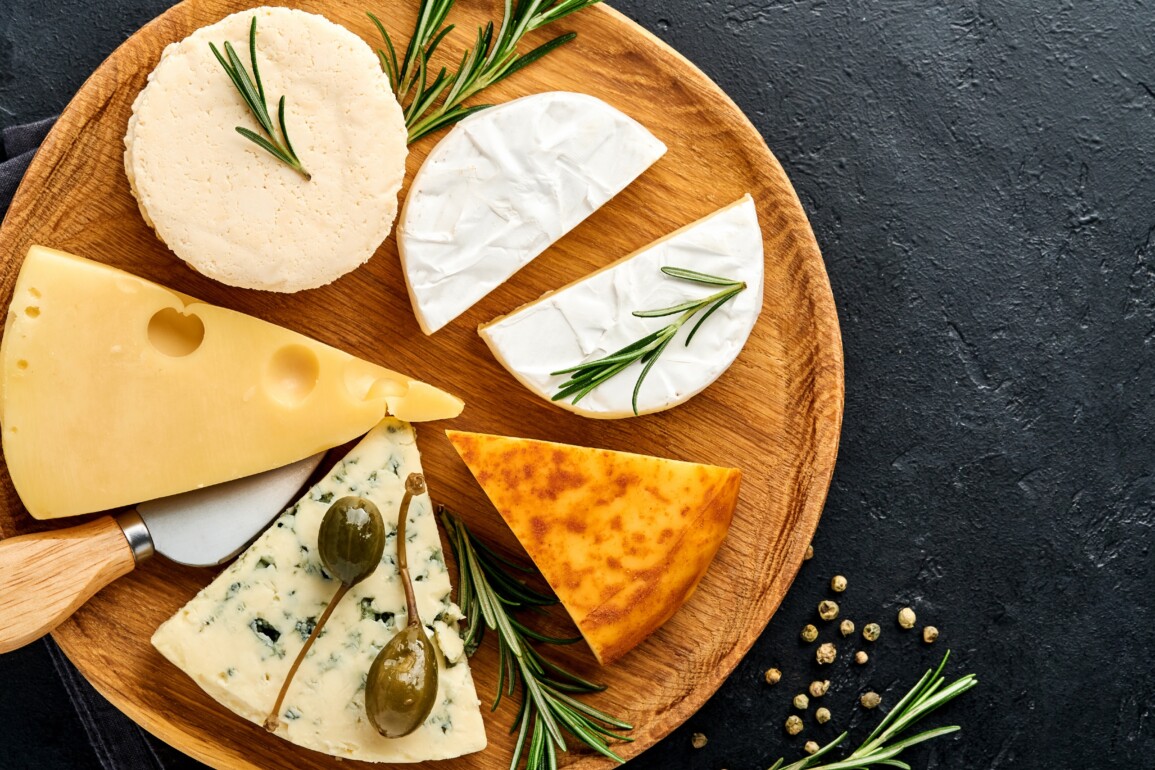Does cheese give you nightmares, or is it a myth? Today, we’re going to reveal the truth about cheese before bed, and expose the pros and cons of snacking on your favourite savory before slumber. If you’re ready, let’s debunk your misconceptions about cheese and nightmares!
Sweet dreams are made of cheese. Indeed, there are few other foods in the world today that have the same connection to sleep as cheese.
If you’ve ever woken up from a bizarre dream after indulging in a late-night cheese board, you’ve probably blamed your cheesy meal for your restless nights already.
The question is, does cheese give you nightmares? Does cheese induced sleepwalking occur? Or is it all just old wives tales?
It seems as though everyone and their grandmother have some idea of what a slice of brie or a chunk of cheddar will do to your sleeping pattern. Despite countless myths and rumours about the connection between cheese and sleep, there isn’t actually a lot of scientific research into the subject.
Nutritionists know that some foods are better to eat before bedtime than others. For instance, drinking a cup of chamomile tea with some whole grains before bed will help you settle in for a more restful night.
We also know that certain foods can be bad for your sleep hygiene. If you chow down on items that are rich in sugar, fats, or caffeine before bed, then you’re sure to have a difficult night.
But, what’s the situation with cheese? Why shouldn’t you eat cheese before bed?
Can cheese give you weird dreams? Will it increase your risk of a bad night’s sleep? Will eating cheese before you sleep cause weight gain?
It’s time to get to the bottom of this mystery, once and for all.

Cheese and sleep: The truth about your midnight snack
There’s a lot of controversy in the world of sleep about the benefits of eating before bed.
Whether you’re chomping on cheese or snacking on a chocolate bar before you hit the hay, some experts believe that eating before you rest is a good idea. After all, few things are more likely to distract you more from a great night’s sleep than a perpetual rumble in your stomach.
However, other researchers believe that eating anything too close to your bedtime is bad for your sleep hygiene. Why? Because eating forces your metabolism to get to work, which keeps parts of your body awake when you should be in rest mode.
So, how does eating cheese at night affect you?
Well, if you listen to your grandparents, auntie, and uncles, or even your parents, then you’ve probably heard that eating cheese before you sleep will cause nightmares.
Though we’re not 100% sure where this idea came from, most people believe that the source of the cheese and sleep connection is Charles Dickens’ book, “A Christmas Carol.”
In the famous novel, Ebenezer Scrooge blames his supernatural encounters with spirits of the past, present, and future, on a “crumb of cheese.” Since then, the idea that eating cheese at night has an impact on your dreams has grown stronger than ever.
So, is there any truth to the rumour?
As mentioned above, there’s not a lot of scientific research into the link between cheese and sleep problems. What we do know is that our brains and sleeping patterns are affected by a wide variety of hormones. The hormones that run rampant in your mind when you’re ready to sleep include:
- Serotonin (the stuff that promotes happiness and relaxation).
- Melatonin (the hormone that regulates your sleep/wake cycle).
- Testosterone (the substance that regulates libido and other components).
These hormones affect how you think and act, and how your body functions.
Cheese plays host to its very own hormone — an amino acid called tryptophan. You might have heard of tryptophan before — it’s the substance in turkey that makes you feel sleepy after a big Sunday dinner, or after you’ve overeaten on Christmas day.
Scientists also believe that tryptophan helps to promote the production of serotonin in your brain, which is the chemical that helps to improve your quality of sleep by making you feel comfortable and relaxed.
Getting a hefty dose of tryptophan and serotonin at nighttime can induce a more valuable, deeper quality of sleep — where dreams are a lot more likely.
In other words, scientifically, cheese, and dreams are connected. However, there’s absolutely no evidence to suggest that the dreams you’ll get from the cheese will be nightmares.

What happens when you eat cheese before bed?
So, based on what we know about cheese, tryptophan, and serotonin, is it okay to eat cheese at night, or should you be avoiding it at all costs?
Well, it’s tough to know for certain.
The lack of research into cheese and sleep problems means that most of the suggestions we could make about your dairy habits would just be guessing. The only real source of scientific research we can look at come from a somewhat unreliable source — the British Cheese Board.
The company investigated this in 2005, where participants were asked to consume about 3 ounces of cheese before bed each night. Although the study had a wide range of respondents to work with — there was no baseline.
We don’t know, for instance, if the people involved had nightmares or vivid dreams when they weren’t eating cheese at all.
There’s a good chance that the British Cheese Board’s study was more of a marketing stunt than a real scientific report. However, it did give us some basic insights into the repercussions of eating cheese before bed.
For instance, 75% of the volunteers said that they slept well every night that they ate cheese, and most of those people couldn’t even remember what their dreams involved.
The Cheese Board took the results to mean that the tryptophan in cheese was having a significant impact on the people eating it before bed, by helping to reduce stress levels and enhancing sleeping patterns.
In other words, the Cheese Board believed that eating cheese before you sleep will actually help to improve your sleeping patterns.
One thing that made this study into cheese and insomnia so interesting, is that during an interview with the National Public Radio, the Secretary of the Cheese Board went deeper into the findings. Secretary Nigel White said that certain cheeses were more likely to contribute to different kinds of dreams for participants of the study.
For instance, people who ate Blue Stilton before bed were more likely to have very vivid or “wacky” dreams than their counterparts. These dreams weren’t necessarily described as nightmares, however.
White also mentioned that people eating typical cheddar before bed were more likely to have dreams about celebrities — which is an exciting development. Cheshire cheese was most likely to contribute to a relaxing and dreamless sleep, while Red Leicester produced nostalgic dreams based on memories from childhood.
For those who often suffer from sleep anxiety and stress caused by work worries, Lancashire cheese was the one most closely connected with nightmares. According to the report, this kind of cheese caused dreams about work — which is about as close to nightmare fuel as the report got.

Is it true that eating cheese gives you nightmares?
So, can cheese give you weird dreams?
If the reports from the British Cheese Board are anything to go by, the answer is a resounding “yes.” Eating cheese before you sleep (particularly certain types) could affect what you dream about. However, the report didn’t say anything about an increased risk of nightmares.
Remember, nightmares aren’t just bad dreams. A nightmare is a dream that’s so disruptive and upsetting that it forces you to wake up during the night. Although you might have ideas that you don’t feel comfortable with when you eat cheese before bed — there’s no evidence that you’ll experience a genuine nightmare.
Ultimately, though the rumours about cheese and insomnia suggest that indulging in a few crackers before bed will leave you tossing and turning to the morning — this may be a myth.
The nutrients and vitamins in cheese actually have the potential to make a positive difference to your sleeping pattern. Low-fat cheese, in particular, are high in tryptophan and calcium, which both have an impact on your nerve and stress levels, helping you to relax in time for bed.
Eating cheese (or any snack for that matter) before bed could also prevent uncomfortable tossing and turning caused by unsatisfied hunger.
Cheese and crackers before you go to sleep will give you a great dose of carbohydrates and protein, which keeps the appetite properly satisfied until morning. The National Sleep Foundation even goes as far as to recommend cottage cheese as a go-to nighttime snack, thanks to its higher than usual tryptophan content.
Some studies also suggest that cottage cheese might be useful to eat before bed if you’re looking for an opportunity to lose weight. One report published by the British Journal of Nutrition found that eating two tablespoons of the low-fat cheese before bedtime speeds up your metabolism while you sleep.
More research is needed into this concept, but if it turns out that cottage cheese can help you to lose weight — that’s a good sign. It suggests that cheese before bed not only boosts your sleeping quality but also protects you from the nightmare of an exhausting weight loss routine too.

Cheese and dreams: Does eating cheese help you sleep?
The limited research available into eating cheese at night suggests that there is some connection between cheese and dreams. At a top-level, the connection is caused by an amino acid called tryptophan which supports the creation of serotonin and melatonin.
Both melatonin and serotonin are crucial in helping you get to sleep, so an extra dose of tryptophan really can go a long way before bed-time. It helps to stabilize your sleep pattern and reduce your stress levels, so you’re less likely to feel anxious, when you’re trying to get to sleep.
Tryptamine is related to tryptophan, and it is also one of the substances that you can find in mild hallucinogenic medications. That might be why there are so many rumours floating around that eating cheese before you sleep will cause more vivid dreams or nightmares. Crucially, tryptamine appears more often in blue cheeses.
Eating blue cheese before bed
The bacteria in those super-smelly cheeses that connoisseurs love may interact with the chemicals in your body to create more memorable, bizarre, or convoluted dreams.
The reason that these substances have such a significant impact on your sleeping habits and dreams, is that the bacteria and fungus that you ingest with mouldy cheeses introduce different substances into your biological system.
When the mould breaks down, it creates compounds that are more likely to cause hallucinogenic responses.
If you’re worried about cheese and insomnia, then your best bet could be to avoid older cheeses entirely and stick with low-fat options that are rich in both tryptophan and calcium.
Eating cottage cheese before bed
Low-fat, high-protein cheeses like cottage cheese are fantastic for packing your body full of relaxation-inducing substances like tryptophan, melatonin, and serotonin.
While the tryptophan in your cheese will help you to drift off to sleep more peacefully, the high levels of calcium in things like cottage cheese will also help you to stay asleep for longer.
Calcium is essential for REM sleep, and it assists with keeping the mind relaxed over an extended period of time, contributing to a more restful evening overall.
The better your REM sleep, the more restorative your sleeping cycle can be. Calcium also contributes to other deep-stage sleep phases, which may allow you to recover more completely during the night and feel refreshed when you wake up in the morning.
However, since REM sleep is associated with dreaming, if you get more of that in your evening cycles, there’s a chance that you might have a higher risk of experiencing nightmares.
It’s just as likely that you may end up with a higher number of good dreams when you’re packed full of calcium too — however.

Is it okay to eat cheese at night?
Given the lack of evidence that eating cheese before you sleep causes nightmares, it’s safe to say that you can eat this food before bedtime if you like.
However, it is worth noting that some experts suggest that you shouldn’t eat any foods at all before you go to bed — whether you’re snacking on cheese or not.
Though arguments into the pros and cons of eating before bed vary, most nutritionists believe that it’s best to finish eating at least 2 hours before bedtime. This gives your metabolism time to settle down before you hit the pillow.
One study has found that eating at night can affect your sleep quality negatively. However, different people respond to food at night in different ways. Other health experts have found that not only is eating before bed fine for your sleep hygiene — but it could even improve your chances of weight loss.
When your digestive system is in full swing, working at breaking down a large meal, a lot of different components in your body need to contribute to the outcome. Because of this, if you are going to eat anything before bed — make sure you keep your snacks light.
One point to note is that despite a few positive studies suggesting that eating cottage cheese before bed can help with losing weight, a lot of research indicates that the later you eat, the more likely you are to gain weight.
There’s no physiological reason why this should be the case. Your metabolism works the same no matter what time of day it is.
However, there may be psychological reasons why eating before bed is bad for your weight. If you get into the habit of snacking before bed—perhaps when you’re sat in front of the television watching Netflix, then you might end up eating unconsciously—when you’re not hungry. This could mean that you accidentally push your calorie intake over your daily needs and increase your chances of gaining weight.
Ultimately, if you decide to eat cheese before bed, or any other food for that matter, the best thing you can do is make sure that you don’t make a habit out of it. While eating cheese before you hit the sack won’t necessarily cause nightmares, overeating before you can cause terrifying problems in a different way.
The truth about cheese and insomnia
The idea that eating cheese before you go to bed will cause nightmares is something that has drifted through cultures for decades.
It’s as common as hearing that your eyes will turn square if you watch too much television, or your mother telling you that you won’t feel the benefit of your coat if you wear it for too long indoors.
However, it turns out that not everything your parents tell you will always be true. There probably isn’t a jolly man that delivers your presents once a year on the 25th of December, for instance, and your teeth aren’t collected by a fairy when you’re a youngster.
It seems like the claim that cheese causes nightmares is just another myth that we’re told when we’re children. Maybe it was just a way for your mom and dad to stop you from snacking on their favourite cheddar too often?
Ultimately, there’s very little evidence that cheese makes a massive difference to what you dream about. Although studies by the British Cheese Board suggest that cheese may affect your dreams to some extent — even that research has more holes in it than a block of Swiss.
For the most part, scientists agree that it’s fine to have a light snack before bedtime if you need it — even if that snack consists of cheese and crackers. All you need to do is make sure that you’re cautious about the kind of cheese you eat.
For instance, cheese infused with coffee, chocolate cheese, or even blue cheese might be more likely to cause sleeping problems. Those issues don’t come from the cheese itself, but the extra ingredients used to give your snack its additional flavour.
If you have a major craving for dairy before you hit the sack, the best option may be to have a spoonful or two of some creamy cottage cheese. This substance is low in fat, high in protein, and brimming with tryptophan — the hormone that’s great for your sleep hygiene.
Want to find out more about how you can improve your sleeping habits? Stay tuned for more expert insights from the team at Siestio.
Siestio. Sleep Matters.
General advice disclaimer
This article contains general tips and advice. However, no diet or exercise program should be started without consulting your physician or other industry professional first. For more information read our full disclaimer here.







